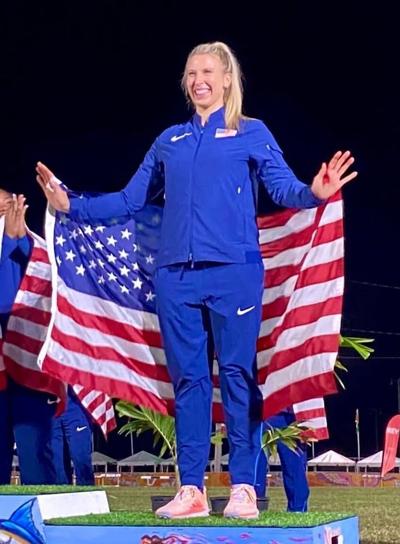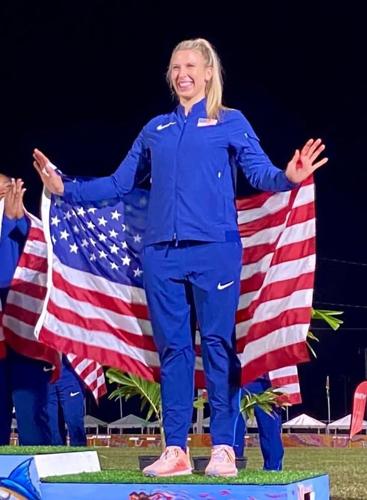Ask Rachel Dincoff about the 2028 Olympic Games in Los Angeles, and only one answer is possible.
“I want to win that thing,” she said.
Even after three surgeries on her Achilles tendon, Dincoff’s drive to achieve is unchanged, much like the appreciation for what she’s already achieved in the women’s discus throw.
A state champion for DeKalb, a collegiate All-American at Auburn and a member of Team USA for the 2020 Tokyo Olympics, Dincoff will always be among the best the state of Indiana has ever seen.
She’ll be enshrined in the Indiana Track and Field Hall of Fame Saturday in Terre Haute, putting her permanently among the state’s finest.
“I feel very honored,” she said. “I’m at a loss for words. It came unexpectedly. It wasn’t something I had my mind on.”
Dincoff will be among 12 individual inductees along with the 1962 Gary Tolleston 440 relay team. Her family and friends will be in attendance.
“What I love about this honor is it gives me a chance to honor people who have helped me achieve these goals,” Dincoff said. “I’m excited to have friends and family there to support me and to be able to give thanks to them in person.
“They’re a part of it. The whole Auburn community is a part of this and I’m really grateful.”
She’s also grateful to be competing again after a suffering a torn Achilles tendon in 2022 during a plyometric workout, which emphasizes explosive movements.
“I heard a pop,” she said.
She’s had the support of her fiance, Dallas Cowboys edge rusher Carl Lawson, who’s had two Achilles surgeries himself (“I told him I one-upped him with that third surgery,” Diincoff said with a laugh).
She’s also had plenty of other help.
“It was a pretty traumatic injury, not being able to do much for two years and trying to figure out what I can do,” said Dincoff. “All of the hard work I’ve put in and all the people in my circle who are helping me — therapists, medical professionals, support from my friends and family — it’s all coming together and helping me get back to what I want to achieve.
“It’s been a very long experience, but a great experience as well.”
Dincoff has taken all the pain, disappointment and discouragement and created a positive mindset.
“It changed the way I trained,” she said. “I’ve always been a hard worker. I’m starting to see there’s more than just working hard or allowing hard work to fix certain problems. It’s taught me to prioritize recovery and prioritize efficiency and finding different ways to strengthen my body that I haven’t looked into before.
“A lot of my training was very weight-room focused. Now I’m doing things that are more focused on stabilizing muscles or strengthening tendons, even doing Pilates, learning how to lengthen and engaging my core and grouping everything together to be able to throw a discus far.”
What she can’t do, her circle can. It includes physical therapists, massage therapists, a sports psychologist, a lifting coach, a discus coach, and a Pilates instructor.
“It’s a big group of people who want to help me reach my goals. With all of that combined, it’s elevating me in ways I never really knew,” she said.
After competing in Tokyo, Dincoff set her sights on the 2024 Games in Paris. Then came the injury.
“The first surgery I was pretty crushed, but I knew I had enough time to get back to try to make the Paris Olympics,” she said. “I was pretty optimistic and determined.
“When I had to have the second surgery I was pretty crushed again. I was optimistic, but there was a little more of a panic that set in. The timeline got shorter to make this goal happen.”
Dincoff knew she still wasn’t right after the second surgery and underwent an MRI. It was found that her Achilles had torn upward and elongated.
At that point it was time for a break.
“When I had to have the third surgery, that was the one that kind of broke my spirit a bit, but it also made me take a step back,” Dincoff said. “I think I needed a little time away from the sport.
“Taking that step back mentally and physically, it helped me prioritize different things in my life. It pushed my mental capabilities to a certain level. It taught me a lot of things. It taught me to reach out for help.”
After that, doctors attempted to use a cadaver tendon to strengthen her own tendon, but her body rejected it.
Doctors instead took part of her hamstring tendon and a section of the flexor digitorum longus (FDL) tendon in her foot.
“They basically roped it all up in there and tied it with my Achilles, and that’s my new little Frankenstein Achilles,” Dincoff said.
Dincoff is competing again, but still has mobility and strength issues to work on.
“It just needs more time and more work,” she said. “We prioritized me getting back into competing as soon as possible.
“It will be a long time before I begin to feel normal, if I ever do.”
Normal or not, Dincoff is positive about her progress as she eyes the City of Angels.
“I think I’m on a good pace to do it,” she said. “This season is going really well.”
“I have a whole group of people who know what my goals are and are helping me achieve it. I think I’ll have a good shot.”



































































(0) comments
Welcome to the discussion.
Log In
Keep it Clean. Please avoid obscene, vulgar, lewd, racist or sexually-oriented language.
PLEASE TURN OFF YOUR CAPS LOCK.
Don't Threaten. Threats of harming another person will not be tolerated.
Be Truthful. Don't knowingly lie about anyone or anything.
Be Nice. No racism, sexism or any sort of -ism that is degrading to another person.
Be Proactive. Use the 'Report' link on each comment to let us know of abusive posts.
Share with Us. We'd love to hear eyewitness accounts, the history behind an article.